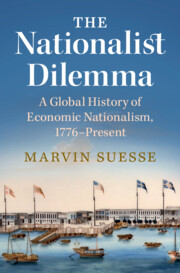Book contents
- The Nationalist Dilemma
- The Nationalist Dilemma
- Copyright page
- Dedication
- Contents
- 1 Introduction: Nationalists Think About the Economy
- 2 The American Community of the Common Man, 1776–1860
- 3 The Birth of the National Economy in Europe, 1789–1860
- 4 The Globalisation of the Nation, 1861–1913
- 5 The Nationalist as Saviour, 1914–1945
- 6 Policy in a World of Nation-States, 1946–1978
- 7 The Incomplete Building of a Global Economy, 1979–2001
- 8 Populist Discontents, 2002–2021
- 9 Conclusion and Outlook: Explaining Economic Nationalism
- Notes
- Index
8 - Populist Discontents, 2002–2021
Published online by Cambridge University Press: 25 April 2023
- The Nationalist Dilemma
- The Nationalist Dilemma
- Copyright page
- Dedication
- Contents
- 1 Introduction: Nationalists Think About the Economy
- 2 The American Community of the Common Man, 1776–1860
- 3 The Birth of the National Economy in Europe, 1789–1860
- 4 The Globalisation of the Nation, 1861–1913
- 5 The Nationalist as Saviour, 1914–1945
- 6 Policy in a World of Nation-States, 1946–1978
- 7 The Incomplete Building of a Global Economy, 1979–2001
- 8 Populist Discontents, 2002–2021
- 9 Conclusion and Outlook: Explaining Economic Nationalism
- Notes
- Index
Summary
China continued its developmental approach after joining the World Trade Organisation in 2001. However, the policy of Xi Jinping also attempted to achieve self-sufficiency in high-tech products through an active industrial policy. This triggered a protective response from China’s trading partners, including India, the United States and Europe. This is one reason for the trend of the 2000s and 2010s towards isolationist approaches. The second factor is the return of populism, which spread not only to high income regions, such as the Britain, Germany, Hungary and the United States, but also to poorer countries, such as Bolivia. In these countries, nationalists from both the left and right wing of the political spectrum blamed rising domestic inequality on global integration. Amplified by the coronavirus pandemic and rising migration induced by military conflicts, populists promoted international decoupling.
Keywords
- Type
- Chapter
- Information
- The Nationalist DilemmaA Global History of Economic Nationalism, 1776–Present, pp. 268 - 322Publisher: Cambridge University PressPrint publication year: 2023

